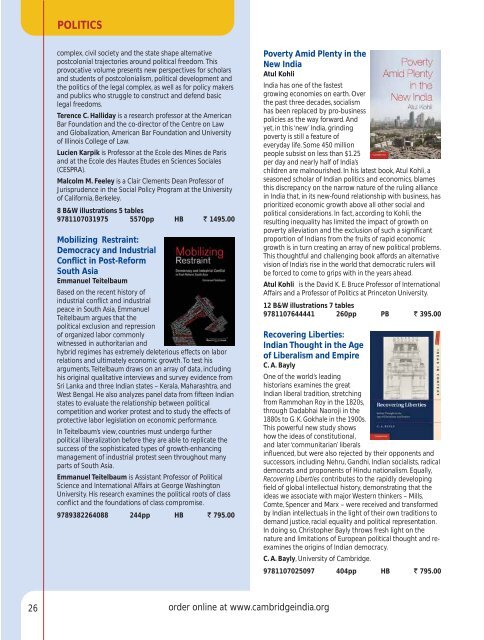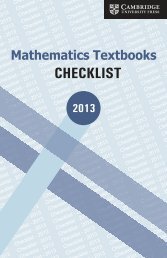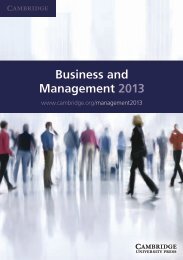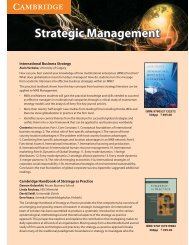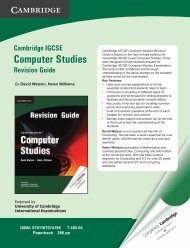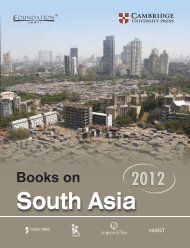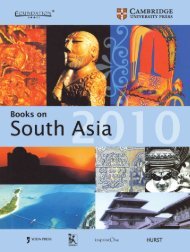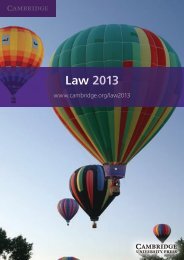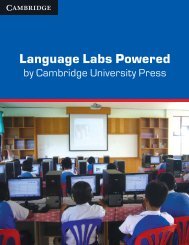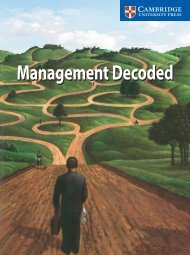India & Cambridge - Cambridge University Press India
India & Cambridge - Cambridge University Press India
India & Cambridge - Cambridge University Press India
- No tags were found...
Create successful ePaper yourself
Turn your PDF publications into a flip-book with our unique Google optimized e-Paper software.
POLITICScomplex, civil society and the state shape alternativepostcolonial trajectories around political freedom. Thisprovocative volume presents new perspectives for scholarsand students of postcolonialism, political development andthe politics of the legal complex, as well as for policy makersand publics who struggle to construct and defend basiclegal freedoms.Terence C. Halliday is a research professor at the AmericanBar Foundation and the co-director of the Centre on Lawand Globalization, American Bar Foundation and <strong>University</strong>of Illinois College of Law.Lucien Karpik is Professor at the Ecole des Mines de Parisand at the Ecole des Hautes Etudes en Sciences Sociales(CESPRA).Malcolm M. Feeley is a Clair Clements Dean Professor ofJurisprudence in the Social Policy Program at the <strong>University</strong>of California, Berkeley.8 B&W illustrations 5 tables9781107031975 5570pp HB ` 1495.00Mobilizing Restraint:Democracy and IndustrialConflict in Post-ReformSouth AsiaEmmanuel TeitelbaumBased on the recent history ofindustrial conflict and industrialpeace in South Asia, EmmanuelTeitelbaum argues that thepolitical exclusion and repressionof organized labor commonlywitnessed in authoritarian andhybrid regimes has extremely deleterious effects on laborrelations and ultimately economic growth. To test hisarguments, Teitelbaum draws on an array of data, includinghis original qualitative interviews and survey evidence fromSri Lanka and three <strong>India</strong>n states – Kerala, Maharashtra, andWest Bengal. He also analyzes panel data from fifteen <strong>India</strong>nstates to evaluate the relationship between politicalcompetition and worker protest and to study the effects ofprotective labor legislation on economic performance.In Teitelbaum’s view, countries must undergo furtherpolitical liberalization before they are able to replicate thesuccess of the sophisticated types of growth-enhancingmanagement of industrial protest seen throughout manyparts of South Asia.Emmanuel Teitelbaum is Assistant Professor of PoliticalScience and International Affairs at George Washington<strong>University</strong>. His research examines the political roots of classconflict and the foundations of class compromise.9789382264088 244pp HB ` 795.00Poverty Amid Plenty in theNew <strong>India</strong>Atul Kohli<strong>India</strong> has one of the fastestgrowing economies on earth. Overthe past three decades, socialismhas been replaced by pro-businesspolicies as the way forward. Andyet, in this ‘new’ <strong>India</strong>, grindingpoverty is still a feature ofeveryday life. Some 450 millionpeople subsist on less than $1.25per day and nearly half of <strong>India</strong>’schildren are malnourished. In his latest book, Atul Kohli, aseasoned scholar of <strong>India</strong>n politics and economics, blamesthis discrepancy on the narrow nature of the ruling alliancein <strong>India</strong> that, in its new-found relationship with business, hasprioritized economic growth above all other social andpolitical considerations. In fact, according to Kohli, theresulting inequality has limited the impact of growth onpoverty alleviation and the exclusion of such a significantproportion of <strong>India</strong>ns from the fruits of rapid economicgrowth is in turn creating an array of new political problems.This thoughtful and challenging book affords an alternativevision of <strong>India</strong>’s rise in the world that democratic rulers willbe forced to come to grips with in the years ahead.Atul Kohli is the David K. E. Bruce Professor of InternationalAffairs and a Professor of Politics at Princeton <strong>University</strong>.12 B&W illustrations 7 tables9781107644441 260pp PB ` 395.00Recovering Liberties:<strong>India</strong>n Thought in the Ageof Liberalism and EmpireC. A. BaylyOne of the world’s leadinghistorians examines the great<strong>India</strong>n liberal tradition, stretchingfrom Rammohan Roy in the 1820s,through Dadabhai Naoroji in the1880s to G. K. Gokhale in the 1900s.This powerful new study showshow the ideas of constitutional,and later ‘communitarian’ liberalsinfluenced, but were also rejected by their opponents andsuccessors, including Nehru, Gandhi, <strong>India</strong>n socialists, radicaldemocrats and proponents of Hindu nationalism. Equally,Recovering Liberties contributes to the rapidly developingfield of global intellectual history, demonstrating that theideas we associate with major Western thinkers – Mills,Comte, Spencer and Marx – were received and transformedby <strong>India</strong>n intellectuals in the light of their own traditions todemand justice, racial equality and political representation.In doing so, Christopher Bayly throws fresh light on thenature and limitations of European political thought and reexaminesthe origins of <strong>India</strong>n democracy.C. A. Bayly, <strong>University</strong> of <strong>Cambridge</strong>.9781107025097 404pp HB ` 795.0026 order online at www.cambridgeindia.org


